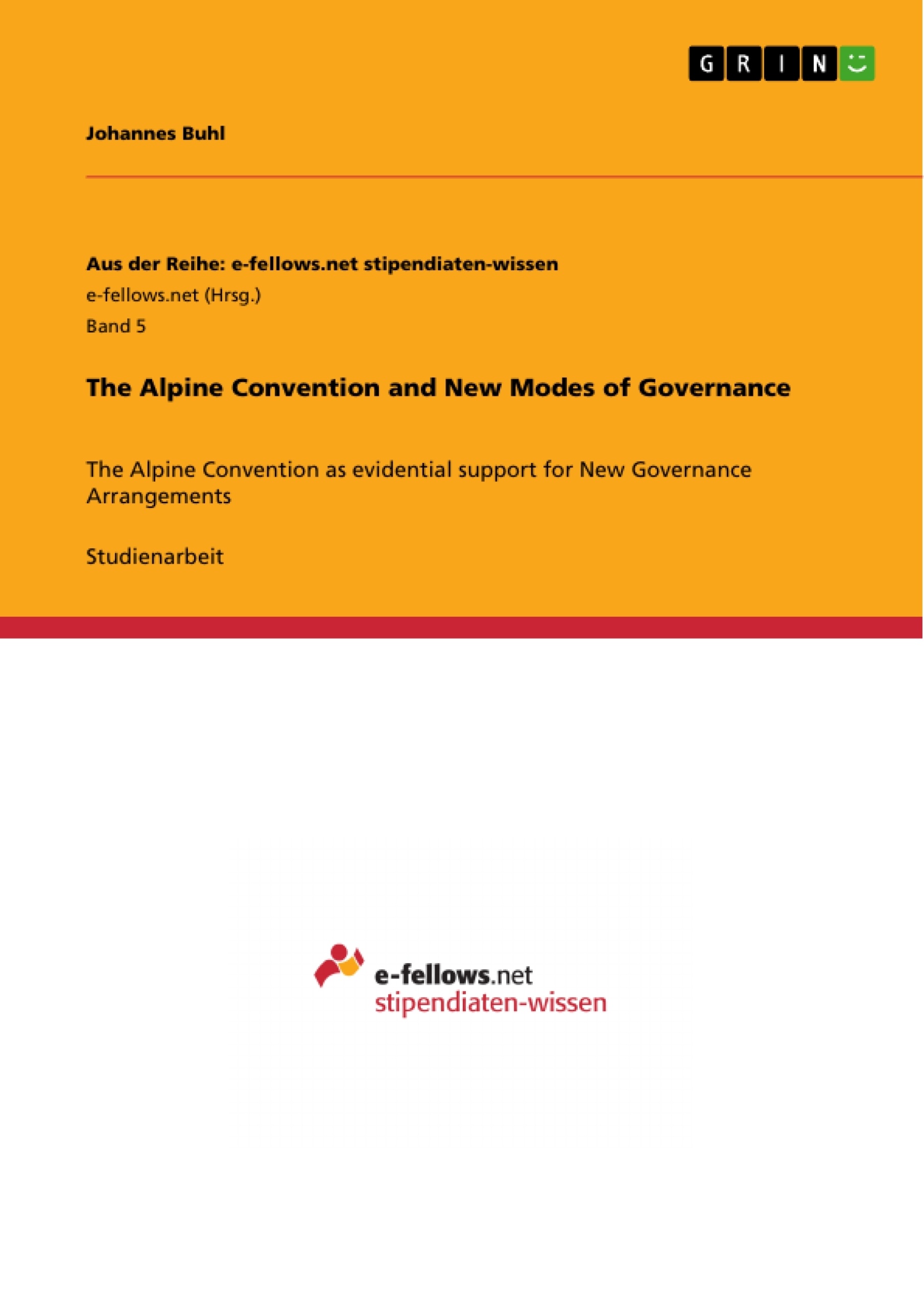The concept of Governance has recently become one of the most popular in contemporary political science and at the same time it is as highly debated as desired to become a useful mode of problem-solving.
The aim of this paper is not to contribute to the theoretical discourse about Governance in first case, but to have a closer look on the applicability of Governance by trying to give evidential support. In other words: This paper is trying to contribute deductively to the Governance approach by examining an empirical case in order to derive theoretical implications.
The following will have a closer look on the Alps as a European region to examine a particular arrangement – the Alpine Convention. What is it? How is it realized and who is involved? What kind of arrangement is it in detail? Is it an empirical case of a Governance arrangement and if so, which implications may be derived for theoretical contribution?
Therefore the Alpine Convention in connection with the Alpine Towns of the Year Association will be presented as an appropriate arrangement of multi-level Governance. Hence, the main goal of this paper is to discuss to what extent this project can be considered as a Governance arrangement and what implications emerge from its argumentation for the Governance concept as a whole. The core hypothesis of the following is that this arrangement can be regarded as a Governance arrangement and that it provides certain proposals to its practical applicability.
To do so, it is first and foremost needed to display the mentioned project which serves as an evidence for applied Governance arrangements in the European hemisphere. In addition, it is necessary to explain what this paper understands Governance to be like in the universe of different perceptions of the term Governance. On this basis, it becomes possible to have a closer look on the relationship between the concept Governance and the Alpine Convention as a project in order to define it more precisely within the theoretical borders of Governance arrangements. The paper´s argumentation is generally based on Mayntz´s and Schmitter´s theoretical approach. After New Modes of Governance as a problem-solving mode, its actors involved and mechanisms observed in Governance arrangements are explained, Governance under the shadow of hierarchy and Governance under the concept of a charter as theoretical implications will be derived.
Inhaltsverzeichnis (Table of Contents)
- Introduction
- The Alpine Convention
- Network of municipalities
- The Alpine Town of the Year Association
- Sonthofen im Allgäu – Alpine Town of the Year 2005
- New Modes of Governance
- Governance as problem-solving mode
- Actors involved in Governance Arrangements
- Mechanisms in Governance Arrangements
- Theoretical Implications
- Governance under the shadow of hierarchy
- Governance under the principle of a charter
- Conclusion
Zielsetzung und Themenschwerpunkte (Objectives and Key Themes)
Der Zweck dieses Papiers ist es, die Anwendbarkeit des Governance-Konzepts anhand eines empirischen Falls zu untersuchen und so einen Beitrag zur Governance-Forschung zu leisten. Das Papier analysiert die Alpenregion und speziell die Alpenkonvention. Es untersucht die Struktur und Funktionsweise der Alpenkonvention, insbesondere im Kontext der „Alpine Town of the Year Association“.
- Die Alpenkonvention als Beispiel für Governance-Arrangements
- Die Rolle der „Alpine Town of the Year Association“ im Kontext der Alpenkonvention
- Die multi-level Governance Struktur der Alpenkonvention
- Theoretische Implikationen der Alpenkonvention für das Governance-Konzept
- Die Herausforderungen und Chancen der nachhaltigen Entwicklung der Alpenregion
Zusammenfassung der Kapitel (Chapter Summaries)
Das Papier beginnt mit einer Einführung in das Governance-Konzept und seiner Relevanz für die politische Wissenschaft. Anschließend werden die Alpenkonvention und ihre Ziele vorgestellt, wobei die Rolle der „Alpine Town of the Year Association“ als Beispiel für lokale Governance-Aktivitäten hervorgehoben wird. Die Kapitel analysieren die Akteure und Mechanismen, die an Governance-Arrangements beteiligt sind, und diskutieren die theoretischen Implikationen der Alpenkonvention für das Governance-Konzept.
Schlüsselwörter (Keywords)
Governance, Alpenkonvention, Alpine Town of the Year Association, multi-level Governance, nachhaltige Entwicklung, Alpenregion, Netzwerk, CIPRA.
Häufig gestellte Fragen
Was ist die Alpenkonvention?
Die Alpenkonvention ist ein internationales Abkommen zwischen den Alpenländern und der EU zur nachhaltigen Entwicklung und zum Schutz der Alpenregion.
Wie funktioniert Multi-Level-Governance in der Alpenregion?
Es beschreibt die Zusammenarbeit auf verschiedenen Ebenen – von der internationalen Politik über nationale Regierungen bis hin zu lokalen Gemeinden und Netzwerken.
Was ist die „Alpine Town of the Year Association“?
Ein Netzwerk von Städten im Alpenraum, die sich für die Umsetzung der Ziele der Alpenkonvention auf lokaler Ebene einsetzen und nachhaltige Stadtentwicklung fördern.
Welche Rolle spielt Sonthofen in diesem Kontext?
Sonthofen wurde 2005 zur Alpenstadt des Jahres gewählt und dient als Fallbeispiel für die praktische Anwendung von Governance-Strukturen in der Region.
Was bedeutet „Governance unter dem Schatten der Hierarchie“?
Es bezeichnet Kooperationsformen, die zwar auf Freiwilligkeit basieren, aber durch staatliche Rahmenbedingungen oder drohende Regulierungen beeinflusst werden.
- Quote paper
- Johannes Buhl (Author), 2009, The Alpine Convention and New Modes of Governance, Munich, GRIN Verlag, https://www.grin.com/document/173950



